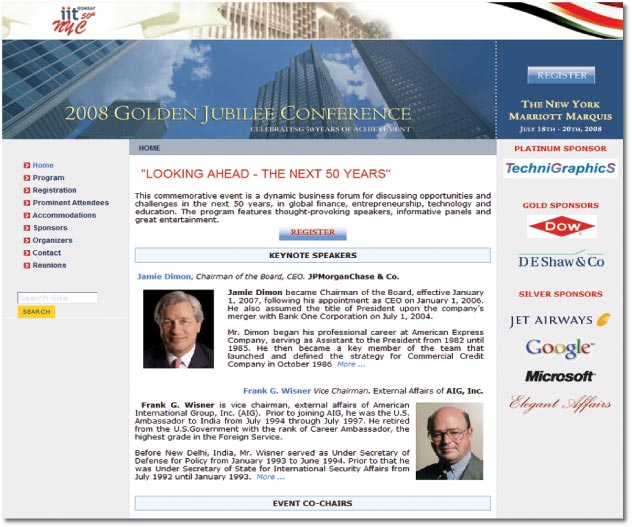|
|
|
ADVERTISEMENTS
|
|
PREMIUM
- HAPPY HOLIDAYS!
- Siliconeer Mobile App - Download Now
- Siliconeer - Multimedia Magazine - email-Subscription
- Avex Funding: Home Loans
- Comcast Xfinity Triple Play Voice - Internet - TV
- AKSHAY PATRA - Bay Area Event - Sat. Dec 6
- Calcoast Mortgage - Home Loans
- New Homes in Silicon Valley: City Ventures - Loden Place - Morgan Hill
- Bombay to Goa Restaurant, Sunnyvale
- Buying, Sellling Real Estate in Fremont, SF Bay Area, CA - Happy Living 4U - Realtor Ashok K. Gupta & Vijay Shah
- Sunnyvale Hindu Temple: December Events
- ARYA Global Cuisine, Cupertino - New Year's Eve Party - Belly Dancing and more
- Bhindi Jewellers - ROLEX
- Dadi Pariwar USA Foundation - Chappan Bhog - Sunnyvale Temple - Nov 16, 2014 - 1 PM
- India Chaat Cuisine, Sunnyvale
- Matrix Insurance Agency: Obamacare - New Healthcare Insurance Policies, Visitors Insurance and more
- New India Bazar: Groceries: Special Sale
- The Chugh Firm - Attorneys and CPAs
- California Temple Schedules
- Christ Church of India - Mela - Bharath to the Bay
- Taste of India - Fremont
- MILAN Indian Cuisine & Milan Sweet Center, Milpitas
- Shiva's Restaurant, Mountain View
- Indian Holiday Options: Vacation in India
- Sakoon Restaurant, Mountain View
- Bombay Garden Restaurants, SF Bay Area
- Law Offices of Mahesh Bajoria - Labor Law
- Sri Venkatesh Bhavan - Pleasanton - South Indian Food
- Alam Accountancy Corporation - Business & Tax Services
- Chaat Paradise, Mountain View & Fremont
- Chaat House, Fremont & Sunnyvale
- Balaji Temple - December Events
- God's Love
- Kids Castle, Newark Fremont: NEW COUPONS
- Pani Puri Company, Santa Clara
- Pandit Parashar (Astrologer)
- Acharya Krishna Kumar Pandey
- Astrologer Mahendra Swamy
- Raj Palace, San Jose: Six Dollars - 10 Samosas
CLASSIFIEDS
MULTIMEDIA VIDEO
|
|
|
|
|
ETHICS:
Tarnished Gold Dow and IIT Bombay:
IIT Bombay Golden Jubilee
Shripad Dharmadhikary asks: As the people of Bhopal continue to suffer, how can IIT Bombay associate with, and lend its credibility to Dow, which was a sponsor for its Golden Jubilee Gala in New York?

The Indian Institute of Technology Bombay’s Golden Jubilee Gala Event was held in New York From July 18-20. As an alumnus of this august institution, I am proud that it has completed 50 years. Yet, its showcase celebrations in New York leave one with mixed feelings as one of the Gold Sponsors is Dow Chemicals.
On Feb. 6, 2001, Union Carbide Corporation became a fully owned subsidiary of Dow chemicals. UCC was the owner of Union Carbide India Limited, whose factory in Bhopal in December 1984 was responsible for one of worst cases of industrial disasters in history, a reprehensible act resulting from several grossly criminal omissions and commissions. The Bhopal gas leak tragedy killed thousands Dec. 3, 1984, and in the 23 years following, has killed thousands more, and has dammed thousands of others to a life of disability and disease. The victims have received neither full compensation nor justice and Bhopal continues to be blot on India’s record of human rights. UCC remains accountable for Bhopal, and as its 100 percent owners, so does Dow.
As the people of Bhopal continue to suffer, how can IIT Bombay associate with, and lend its credibility to Dow? This is a question that has marred the Golden Jubilee celebrations for me and for many other alumni. Earlier, 43 faculty members of IIT Bombay wrote an Open Letter to the organizers of the New York event, urging them to “reject any offer of a relationship with Dow Chemical or any of its subsidiaries” and in particular “strongly urg[ing] … to refuse sponsorship from Dow Chemical for the 2008 Golden Jubilee Conference, planned for 18-20 July 2008.” The letter notes that UCC is a key accused in a criminal case related to the Bhopal disaster, and is a declared absconder as it has not responded to the summons. It mentions several other environmental and legal liabilities of Dow in support of the call. Around 500 others, mainly alumni of IIT Bombay, have signed a petition which makes a similar call.
UCC (and by implication Dow), tries to disassociate itself from the Bhopal tragedy by saying that “In 1994, Union Carbide sold its entire stake in UCIL to MacLeod Russell (India) Limited of Calcutta, and UCIL was renamed Eveready Industries India, Limited (Eveready Industries). As a result of the sale of its shares in UCIL, Union Carbide retained no interest in — or liability for — the Bhopal site.” (http://www.bhopal.com/ucs.htm) This is a specious argument at best, and legally untenable. Sale of UCIL does not relieve UCC of the criminal liability, and it is UCC which is named in the criminal cases, and it is UCC that is the declared absconder. Dow, as 100 percent owner, is fully accountable for the liabilities of UCC. As recently as February 2008, the Union law ministry of India has underscored that Dow Chemical would have to face all the pending legal liabilities of Union Carbide.
Given all this, it would be unfortunate if IIT Bombay continued with Dow’s sponsorship of the event. It has certainly tainted the Golden Jubilee functions. Lest it be said that this is all last minute, it should be pointed out that many alumni and faculty have been raising this issue for months now.
What About Others?
Moreover, this whole discussion also raises the need to go beyond Dow. IIT Bombay, its faculty and its alumni, by their very nature are required to have interactions with the corporate sector. Indeed, there is a need to increase and deepen the relationship between IITs and the corporate sector. Given this, it is very important which corporations IIT Bombay chooses to associate itself with, and chooses not to associate with. This would go also for the alumni associations. This is really critical as the IITs, its various alumni bodies, and their activities have become very high profile in the recent years. They send strong signals to society, and IITs and its alumni are among the key opinion makers. If this is so, then it is essential that this role be played in a responsible manner. This means that IIT Bombay does not associate itself with corporations (and others) that are at least blatantly guilty of serious violations of environmental, human rights and legal norms.
There are some arguments presented against taking such stands. Sometime back, when there was similar controversy over IITs accepting some funding from Dow chemicals, an alumnus said that “instead of trying to be holier than thou, and becoming judge, jury and executioner all at once, IITians should let the courts and the legal system take their course, and IITs should be open to taking funds for ethical projects and fellowships from any corporation that abides by the laws of India.”
Leaving aside the Dow case, where UCC is not abiding by Indian law and has been declared absconder, this argument would be useful in a perfect world, where the law, “taking its own course” reaches justice. But the world is not perfect, and India particularly far from it. If one goes by what the law has decided, India would be one of the most corruption free country in the world. Indeed, history (and current events) shows that more often than not, the law and the legal system side with and protect the interests of the powerful and the elite, and tend to neglect or even push aside those of the weaker sections. In any case, issues of environment and human rights go much beyond the mere legal framework.
That is why it is incumbent on society — and its leaders — to take stands (and actions, and extend support) on such matters, if we ultimately want a society based on the principles of justice and fairness. That is why it is important for IIT Bombay and alumni to show that they are not ready to bestow credibility on those responsible for serious social and environmental wrong-doings. We need to show that we are not isolated from larger societal questions in this context.
It is also argued that this is a very difficult thing to do. How do we determine who is blemished and who is not? It is not easy to establish the responsibility of any specific entity in such matters. There are claims and counter claims. The risk of ending up being holier than thou, and playing judge and jury is real. But this should not be a reason for not taking stands — for then we will end up taking stands on virtually nothing — which is in itself a stand! Moreover, if IIT Bombay and its alumni do not want to deal with a problem because it is tough to handle and involves difficult choices — then we should stop patting ourselves on the back.
However, the very fact that many of the alumni and faculty have raised the issue of Dow and have initiated processes making people think indicates that there is willingness to grapple with the issue. The need is to do this in more formal ways, and institutionalize them. Maybe IIT Bombay, and its various Alumni associations can set up a committee to draw out criteria for accepting sponsorships. There could be a process of wider alumni consultation in this. May be the various alumni gatherings and some of the Golden Jubilee celebration get-togethers could discuss this. I am confident that IITs can set up processes that would help in identifying at least the most blatant offenders.
If sponsorships, funding and support from blatant offenders are refused, it will be an important support to people all over the world struggling against such abuses. It will also send strong signals to society that IIT Bombay and its alumni are concerned about their social responsibility and take it seriously.
Till then, the logo of the likes of Dow will sit at the top of the Golden Jubilee Gala website, (http://gj2008.iitbombay.org/) giving an entirely different meaning to its slogan “Looking Ahead – the Next 50 Years”.
|
 Shripad Dharmadhikary is an alumnus of IIT Bombay. He can be reached by email at shripad@iitbombay.org Shripad Dharmadhikary is an alumnus of IIT Bombay. He can be reached by email at shripad@iitbombay.org
|
|
|
|
|
|